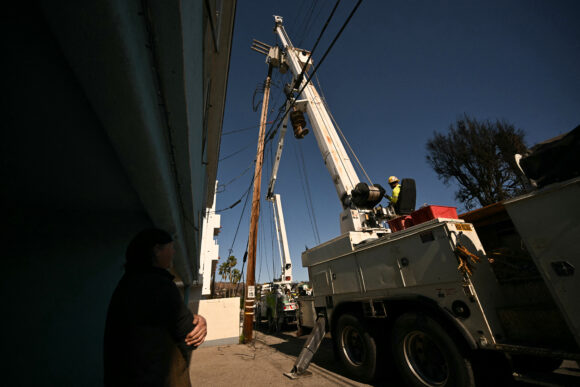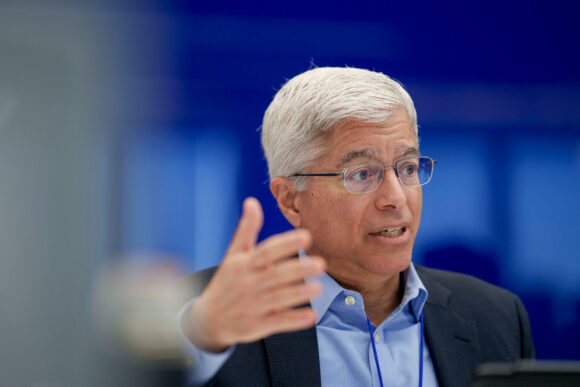The Los Angeles wildfires have generated potentially thousands of new clients for lawyers and prospects for billions in fees. Wall Street wants in on the action, too.
The chance at a piece of strong returns has encouraged investment banks, hedge funds and debt investors to vie for contracts to fund the litigation, according to people involved in transactions. That’s in addition to firms solely dedicated to funding lawsuits, which has grown into a $16 billion industry in the US over two decades.
Related: Homes With Toxic Smoke Damage Deepen Insurance Nightmare in LA
Jefferies Financial Group Inc. and Oppenheimer Holdings Inc. are among the companies trying to broker arrangements to finance residents’ lawsuits against utilities over this year’s fires, which rank among the most destructive in U.S. history, according to copies of solicitations reviewed by Bloomberg News.
The suits against Edison International and Los Angeles Department of Water and Power could be worth tens of billions of dollars in claims, but they are also expensive to bring. For lawyers taking on high-stakes complex cases, especially at smaller firms that don’t have deep reserves of capital, the loans help cover an array of overhead, from client marketing to expert witnesses.
“There’s no question Wall Street has gotten very interested in this segment of the market over the years,” said Samir Parikh, a law professor at Wake Forest University who has studied litigation finance. “It’s grown into a multibillion-dollar business, but it’s not a very transparent market.”
Bankrolling lawsuits remains lightly regulated and operates largely out of public view, even as funders are pouring money into mass tort cases like the fires.
Large Payouts
Investors who back suits seek cases with large potential payouts and a high probability of success. Edison potentially faces damages upwards of $10 billion amid evidence that its equipment sparked the Eaton Fire, which killed 18 people and destroyed about 9,400 structures. A trial is scheduled for June 2026.
Related: Climate Group Says State Farm Rate Hike to Cost California Homeowners $1,000
Separately, suits are piling up against LADWP over the Palisades Fire, which killed 12 people and destroyed almost 7,000 structures in neighborhoods near the Pacific Coast filled with multimillion-dollar homes. One insurer said that damages from only 20% of the structures burned in the Palisades Fire exceed $4 billion.
In response to a question about law firms taking loans to sue utilities, Edison pointed to the wildfire insurance fund set up by state policymakers six years ago to ensure that California’s main private utilities stay solvent and victims recoup their losses.
“The wildfire fund should support only those impacted by a wildfire,” said David Eisenhauer, a spokesman for Edison.

Representatives of Jefferies and Oppenheimer declined to comment. LADWP had no comment.
As with other high-volume civil litigation over harm to people and property, known as mass torts, law firms generally work on a contingency basis in wildfire cases — and bill fees of 25% to 40% on what they recover for victims.
While that may seem steep, the cases are costly to develop, requiring extensive investigations to identify how a fire started and analyze evidence. It may be years before the law firms see a payday.
The more than 50 law firms that make up the steering committee for the Eaton Fire litigation in Los Angeles Superior Court have each agreed to contribute $50,000 for upfront costs, according to Mikal Watts, a veteran plaintiffs’ lawyer who is helping to oversee the cases. Dozens of lawyers with L.A. fire cases either didn’t respond to requests to discuss litigation funding or declined to speak about it.
Third-Party Funders
The third-party funders, including investment firms and asset managers, help law firms shoulder costs with loans that cover their entire caseloads. The mechanism known as litigation finance often comes with double-digit interest rates that can exceed 20% on an annualized basis.
Ordinarily the loans mature in three to four years, when they have to be paid back or refinanced. Lenders routinely require non-disclosure agreements to keep their arrangements confidential. The return for the lenders doesn’t come from the payouts to victims.
Related: Homeowners Suing USAA and AAA Insurers Over LA Wildfires
Jefferies was among a small group of funders at the forefront of wildfire litigation financing when a series of massive blazes in Northern California sent PG&E Corp., the state’s largest utility, into bankruptcy in 2019. The firm’s special situations group touted that experience in a Jan. 16 solicitation email to a veteran lawyer working on the LA fires.
This time around, the market is crowded with funders who are willing to accept lower returns rather than the multiples that the PG&E transactions generated, according to people involved in transactions.
The law-firm loans Jefferies is brokering typically provide tens of millions of dollars and are used to build up case inventories and cover legal expenses. They include constraints on how quickly the lawyers can spend the money, as well as a minimum return for the funders, according to the people, who requested anonymity to discuss confidential information.
Oppenheimer Solicitation
Oppenheimer, which manages $28 billion in assets, is also acting as an intermediary for funders.
Ron Ryder, co-head of special assets trading at the firm, said in a March 17 solicitation email reviewed by Bloomberg News that Oppenheimer is “representing large, institutional asset-managers” that would provide financing options for law firms representing fire victims. He added that Oppenheimer’s clients would be interested in “purchasing an attorney’s contingency fee as it relates to the outcome of these wildfire cases.”
Separately, Oppenheimer has been trading insurers’ claims tied to the Eaton and Palisades fires, Bloomberg News reported in March. Hedge funds involved in such transactions have faced pushback from a California regulator that has called them “opportunistic” speculation.
Read More: Hedge Funds Face California Rebuke Over Role in Wildfire Claims
The sale of so-called subrogation claims allows investors to obtain an insurer’s right to compensation from a utility if it’s found liable for fire-related damage. There was a brisk trade in subrogation claims during the PG&E bankruptcy, in which Jefferies was active both as an investor and broker.
Eaton Fire
The Eaton Fire litigation may be especially enticing to investors. While no investigating agency has yet determined the cause of the blaze that started during a windstorm on the evening of Jan. 7, Edison’s chief executive officer has acknowledged that “circumstantial information” points to the company’s equipment. That includes video clips showing flames erupting in dry vegetation at the base of Edison transmission towers.
Also working in favor of lawyers suing Edison is California’s low bar for holding utilities responsible for fire damage. Under the legal doctrine of inverse condemnation, which entitles home and business owners to compensation when utilities damage private property, victims don’t need to prove that a utility acted negligently, only that its equipment started the fire.
And there is far less risk that Edison will go bankrupt like PG&E thanks to the California Wildfire Fund. The state-backed fund will reimburse Edison for claims if the company covers the first $1 billion through its own insurance and isn’t found to have acted imprudently.
Read More: Third-Party Funding for Litigation Faces States’ Scrutiny
The financing of litigation has grown especially sensitive around a swirl of proposals to increase transparency and impose taxes on proceeds — legislative efforts that are supported by business groups including the US Chamber of Commerce.
Law firms aren’t required to disclose funding in Los Angeles Superior Court, where the wildfire cases are playing out. Still, under California’s legal ethics rules, lawyers in the state must generally inform their clients of litigation funding arrangements.
Wildfire Lawyers
Some wildfire lawyers said they were offered funding but refused to take it.
Los Angeles lawyer Richard Bridgford, who has more than 500 clients seeking compensation for homes and businesses destroyed in January, said he started receiving solicitations shortly after the fires — and is still getting them — but won’t take outside funding.
“I don’t ever want to be in that position of having to settle my client’s case short because I’m in a rush to not have to pay someone back a bunch of money,” the 65-year-old lawyer told a group of two dozen potential clients during a March meeting at a Pasadena hotel.
But funding can be crucial for homeowners’ attorneys who lack the financial resources to go up against power companies’ legal teams. Veteran personal injury lawyer Anne Andrews said she hasn’t taken funding for her fire cases, but said she’s not opposed to lawyers taking advantage of it.
“Be it your rich uncle, your traditional bank on the corner, or a funder from Wall Street, as long as you maintain the integrity of that relationship and it doesn’t affect your judgment with respect to your clients, I believe it’s a benefit to people who want to practice law, particularly younger folks,” said Andrews.
Top photo: Edison International CEO Pedro Pizarro Photographer: Eric Thayer/Bloomberg.
Topics Lawsuits Catastrophe Natural Disasters Wildfire Louisiana
Was this article valuable?
Here are more articles you may enjoy.



 Judge Awards Applied Systems Preliminary Injunction Against Comulate
Judge Awards Applied Systems Preliminary Injunction Against Comulate  Portugal Deadly Floods Force Evacuations, Collapse Main Highway
Portugal Deadly Floods Force Evacuations, Collapse Main Highway  AIG’s Zaffino: Outcomes From AI Use Went From ‘Aspirational’ to ‘Beyond Expectations’
AIG’s Zaffino: Outcomes From AI Use Went From ‘Aspirational’ to ‘Beyond Expectations’  BMW Recalls Hundreds of Thousands of Cars Over Fire Risk
BMW Recalls Hundreds of Thousands of Cars Over Fire Risk 

